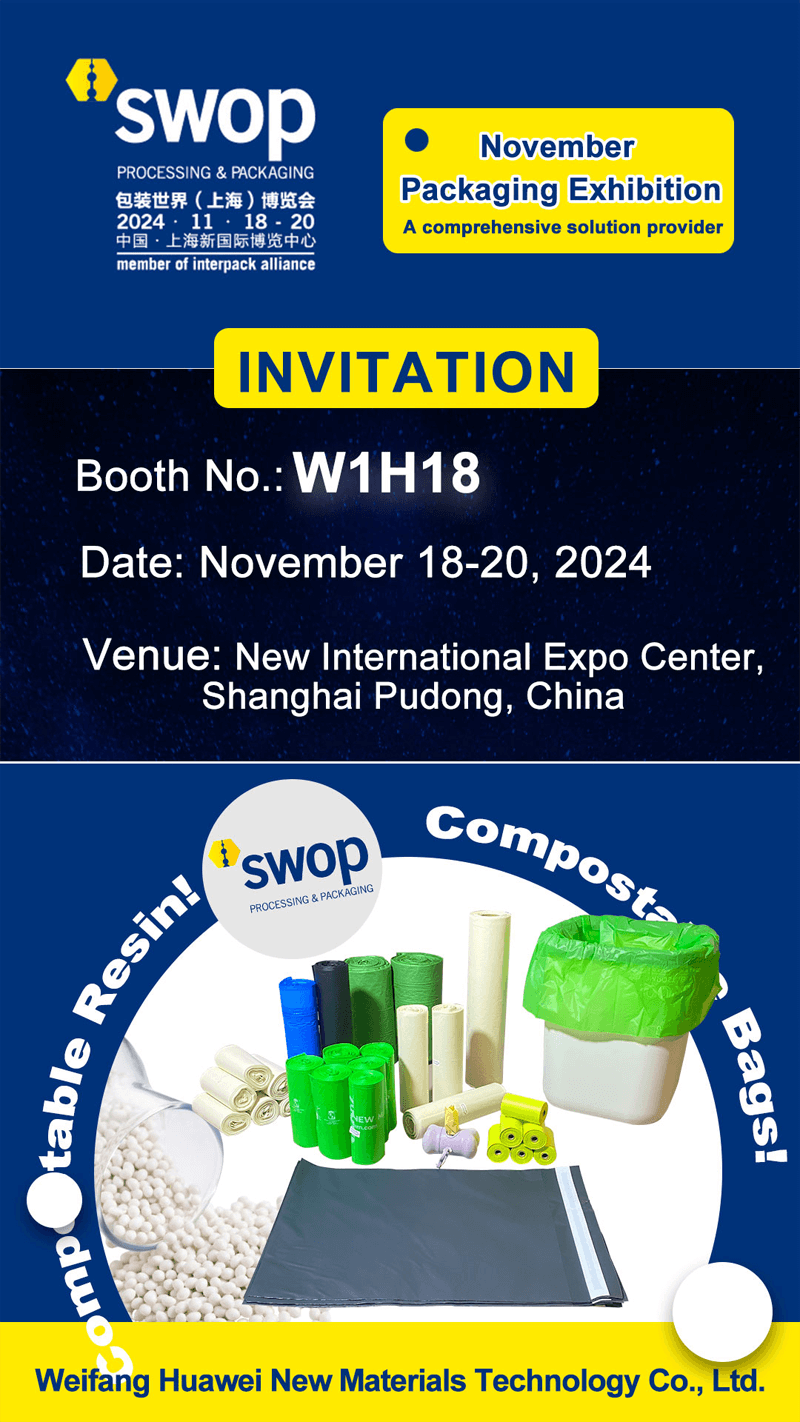Sep. 20, 2024
Biodegradable plastic bags are decomposed by microorganisms and ultimately converted into carbon dioxide and water without releasing toxins.

The decomposition process of biodegradable plastic bags mainly relies on the action of microorganisms, including bacteria, molds, fungi, and algae. Under suitable conditions, these microorganisms biodegrade plastic bags by secreting specific enzymes. The degradation process can be divided into two main ways:
After microbial attack and erosion of polymer materials, the polymer components are hydrolyzed, ionized, or protonated through the growth of biological cells to split into oligomer fragments. This is a degradation process that occurs through the biophysical action of polymers.
Due to the direct action of microorganisms or enzymes, polymers are decomposed or oxidized into small molecules until they are ultimately decomposed into carbon dioxide and water. This degradation method belongs to the biochemical degradation method.
Fully biodegradable materials refer to substances that can be completely biodegraded by microorganisms such as bacteria, fungi, and algae under natural environmental conditions after use and disposal, ultimately producing carbon dioxide and water without producing pollutants. This degradation process is harmless to the environment, has no impact on human health and life, and plays a positive role in environmental protection.
Therefore, the decomposition process of biodegradable plastic bags is achieved through the action of microorganisms, which break down the plastic bags into non-toxic small molecules and ultimately convert them into carbon dioxide and water, thereby achieving environmental protection goals.
Some biodegradable bags may release toxins.

Degradable plastics, although considered an environmentally friendly alternative to traditional plastics, may pose unknown risks to human health during their degradation process in actual environments. For example, biodegradable plastics may produce harmful substances to the human body during the degradation process. A study suggests that when polylactic acid microplastic particles are incompletely degraded in the digestive system, they transform into oligomeric nanoplastic particles, thereby increasing their bioavailability and toxicity, exacerbating the overall toxic effects associated with polylactic acid microplastic particles. In addition, research from Fudan University also suggests that the high affinity between oligomers in biodegradable plastics and catalytic zinc ion finger domains may lead to the inactivation of matrix metalloproteinases, which may mediate adverse intestinal inflammatory effects after exposure to polylactic acid oligomers.
Therefore, although biodegradable plastics aim to reduce their negative impact on the environment, there are some unqualified biodegradable bags that have not been degraded under the conditions of degradation, which may release some toxins and cause certain harm to the human body.
The main reason for the release of toxins from biodegradable bags is related to their composition and degradation process. Some biodegradable plastics, such as polylactic acid (PLA), although considered as environmentally friendly alternatives to traditional plastics, their degradation process may pose unknown risks to human health in actual environments. Research has shown that when polylactic acid microplastic particles are incompletely degraded in the digestive system, they will transform into oligomeric nanoplastic particles, increasing their bioavailability and toxicity, and exacerbating the overall toxic effects associated with polylactic acid microplastic particles. In addition, these plastics may release harmful substances when subjected to changes in hot and cold conditions, although this claim has not been fully confirmed.
The degradation conditions of biodegradable plastics are relatively strict, usually requiring effective degradation under industrial composting conditions. However, there is currently a lack of corresponding supporting facilities internationally to handle a large amount of biodegradable plastics. This often leads to the ultimate destination of biodegradable plastics being incineration or landfill, rather than true biodegradation.
In addition, studies have suggested that the high affinity of polylactic acid oligomers with catalytic zinc ion finger domains may lead to the inactivation of matrix metalloproteinases, which may mediate adverse intestinal inflammatory effects after exposure to polylactic acid oligomers. This further illustrates that biodegradable plastics may have negative impacts on human health under specific conditions.
In summary, the issue of toxin release from biodegradable bags is related to their composition, degradation conditions, and impact on human health. Although biodegradable plastics are considered as environmentally friendly alternatives, their safety in practical use still needs further research and monitoring. Choosing a good brand of biodegradable bags is very important.
Related Products
Latest News
The “Degradable Plastic Bags” You Throw Away Are Secretly Polluting Our Homes
Degradable Bags Become Organic Fertilizer After Use Safety and Environmental Protection
The Situation Of Plastic Waste In 2025
The total consumption and per capita consumption of plastic
Celebrating the Chinese New Year-Rejecting Excessive Packaging And Plastic Waste
What Is The Difference Between Biodegradable Bags And Fully Biodegradable Plastic Bags?
The origin of plastic can be traced back to the mid-19th century.
How Bio Plastic Bags Support Sustainable Product Manufacturing
Do Bio Plastic Bags Release Harmful Substances During Decomposition?
Does Biodegradable Plastic Bags Have an Impact on Environmental Protection
The Difference Between Fully Degradable Plastic Bags And Pseudo Degradable Plastic bags
The Difference Between Fully Degradable Plastic Bags And Pseudo Degradable Plastic bags
The Difference Between Biodegradable Mailer Bags And Traditional Mailer Bags
How Long Does It Take For Wet Garbage And Different Plastic Bags To Degrade?
Degradable Plastic Bags - What Is The Difference Between Degradable, Biodegradable And Compostable?
Current Status and Future Development Trends of Biodegradable Plastic Bag Market in 2024
Traditional Plastic Bags Have Gradually Been Replaced By Biodegradable Plastic Bags
In 2024, Protect Our Planet And Make The New Year More Meaningful
How to Create the Perfect Packaging Field?
From November 22 to November 24, 2023, we participated in Shanghai World Of Packing.
